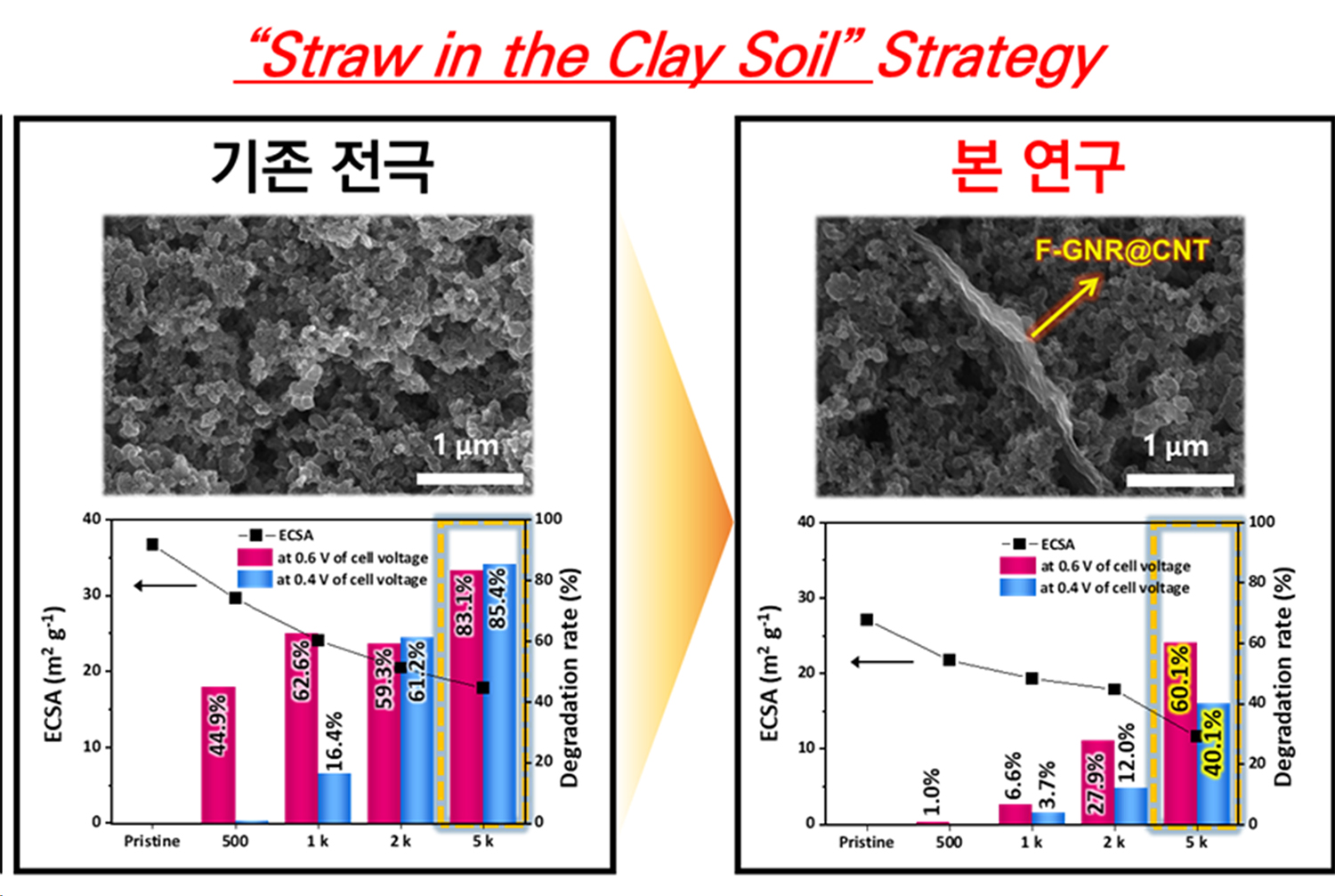연구/산학
PKNU Research 1000
| Seo Min-ho | Research on Improving Hydrogen Fuel Cells Lifespan ‘In the Spotlight’ | |||
| 작성자 | 대외협력과 | 작성일 | 2024-10-25 |
| 조회수 | 598 | ||
| Seo Min-ho | Research on Improving Hydrogen Fuel Cells Lifespan ‘In the Spotlight’ | |||||
 |
대외협력과 |  |
2024-10-25 |  |
598 |
Pukyong National University · Korea Institute of Materials Science · GIST, Develop Technology to Enhance the Lifespan of Hydrogen Fuel Cells
- Development of New Carbon Material Additives for Electrodes… Significantly Improved the Durability of Polymer Electrolyte Membrane Fuel Cells

Professor Seo Min-ho from the Department of Nanotechnology Engineering at Pukyong National University, Dr. Choi Seung-mok from the Korea Institute of Materials Science, and Professor Eom Kwang-seop from the Gwangju Institute of Science and Technology (GIST) research team have successfully enhanced the durability of a commercial-grade polymer electrolyte fuel cell system by utilizing a newly developed carbon material, which was created for the first time globally, as an additive in the electrode manufacturing process.
Polymer electrolyte membrane fuel cells, which are gaining attention as environmentally friendly and high-efficiency batteries, generate electricity by using hydrogen as fuel through a hydrogen oxidation reaction, emitting only water as a reaction product. However, in conventional polymer electrolyte fuel cell systems, the start-up and shut-down processes generate high voltages above 1.4V, which accelerates carbon corrosion in the catalyst layer. This leads to the collapse of the catalyst layer and the phenomenon of water accumulation inside the electrodes due to the water produced during the oxygen reduction reaction (water flooding), which caused a problem with significant reduction in durability.
Professor Seo Min-ho's research team effectively improved the decline in durability of fuel cells caused by carbon corrosion by utilizing a new carbon material with high carbon corrosion resistance as an additive in the electrodes. The fluorine-doped graphene nanoribbons and carbon nanotube composite (F-GNR@CNT) used in this study were developed to overcome the carbon corrosion vulnerability of existing graphene nanoribbon oxides.
Existing graphene nanoribbon oxides become enriched with oxygen functional groups due to strong chemical oxidation during the synthesis process, resulting in significant defects and instability at the boundary regions, making them highly susceptible to electrochemical carbon corrosion during fuel cell operation. Professor Seo Min-ho’s research team synthesized a carbon nanotube composite with high corrosion resistance by controlling the oxidation level and formed stable carbon-fluorine bonds through a heat treatment process for fluorine doping.
Professor Seo Min-ho’s research team developed an electrode manufacturing technology that optimizes the process of adding a minimal amount of the F-GNR@CNT composite in collaboration with Dr. Choi Seung-Mok from the Korea Institute of Materials Science and Dr. Choi Young-Woo from the Korea Institute of Energy Technology and manufactured the electrodes.
In collaboration with Professor Eom Kwang-Seob’s research team from GIST, the durability of accelerated electrochemical carbon corrosion of these electrodes was evaluated, and the results indicated that the degradation rate in the mass transport region of the existing catalyst layer electrode was approximately 85%, while the electrode with the added new carbon material exhibited a degradation rate of about 40%, confirming a very high resistance to electrochemical carbon corrosion.
The principal investigator, Professor Seo Min-ho, stated that “the fluorine-doped graphene nanoribbon and carbon nanotube composite, proven through a combination of experiments and computational science, will be an important strategy for efficiently and easily developing high-durability hydrogen fuel cells when used as an additive in electrodes.
This research achievement was carried out with support from the Pukyong National University’s Young Researcher Challenge Research, the Korea Energy Technology Evaluation Institute, the Korea Industrial Technology Planning and Evaluation Institute, and the fundamental projects of the Korea Institute of Materials Science. The research results were published in the international journal <Advanced Science> with Ph.D. student Jin Song (Korea Institute of Materials Science·GIST) and Dr. Kwon Jun-Hwa(GIST) as the first authors, and Dr. Choi Seung-Mok and professors Eom Kwang-Seob and Seo Min-ho as corresponding authors.
Meanwhile, the research team is conducting follow-up studies to enhance the performance and stability of the polymer electrolyte membrane fuel cell system through the development of catalyst foundational technologies and electrode fabrication processes, including new high-durability carbon supports and nanoparticle structure control.


